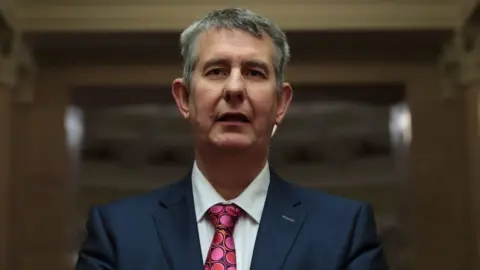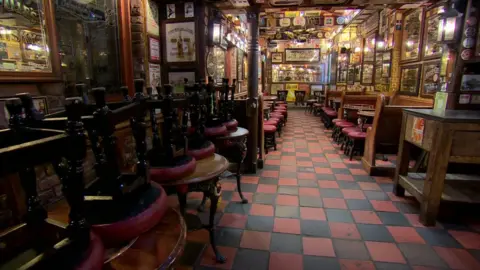Coronavirus: Edwin Poots says DUP opposed new restrictions
 Liam McBurney/ PA
Liam McBurney/ PAAgriculture Minister Edwin Poots said he has "grave reservations" about new coronavirus restrictions agreed by the executive this week.
Mr Poots said lockdown was "unsustainable" and his DUP colleagues were in a "minority" opposing it.
Later on Friday the five main parties at Stormont urged the public to get behind the new restrictions.
A joint statement was signed by all the party leaders, including the DUP's Arlene Foster.
Pubs, restaurants and cafes will close their doors to sit-in customers from 18:00 BST on Friday as all of NI is put under stricter Covid-19 restrictions.
Hair and beauty salons will also have to shut and gyms face additional measures for the next four weeks too.
'Get behind this effort'
The letter from the party leaders said the pandemic in Northern Ireland "has reached an alarming level" and that hospitals here "are in real danger of being overwhelmed".
The leaders said they recognised the disruption and impact on businesses and would work to ensure support is put in place to aid recovery.
The statement said "the actions of every single person matter".
"We have four weeks to turn this around and we're appealing to everyone to please get behind this effort to fight back against Covid-19 and save lives.
"These are difficult days. But it won't last forever and we will get through it.
"Until we do, let's all do everything we can to keep ourselves, and each other safe."
'Entirely different approach'
Speaking to BBC's Talkback earlier on Friday, Mr Poots said: "All of the other parties were prepared to go with this and therefore that is the outcome."
"I have spoken directly to the chief scientific officer and chief medical officer and they believe there may be two more of these lockdowns over the winter.
"We can't live in an eternal lockdown, people need to live their lives, we have to get to a point where life can continue.
"We know a lot more about Covid now than we did back in March, we know who it largely affects, people who are vulnerable and the elderly.
"The impact that is being placed on school children and young people is severe."

Is the DUP playing to the gallery?

Edwin Poots' assault on the Executive's latest Covid restrictions has prompted a row over whether the DUP is really as critical of the clampdown as the agriculture minister maintains.
Or is the party playing to the gallery, given the negative kickback from many businesses?
Under the power sharing rules, any three Executive ministers can insist a significant or controversial item is put to a cross-community vote.
That means if a proposal doesn't have the backing of both a majority of unionist and nationalist ministers it will be blocked.
The last time the DUP used this veto was in early June when they blocked a proposal from the SDLP Minister Nichola Mallon for Stormont to officially request an extension to the Brexit timetable.
Questioned why he and his colleagues didn't simply block the four-week clampdown, Mr Poots said the Assembly had given the Health Minister Robin Swann authority over the regulations leaving his party powerless to act.
However a source close to Mr Swann swiftly contacted the BBC to deny this, pointing out the clampdown had also been approved by the DUP/Sinn Féin controlled Executive Office.
It's understood the key Executive meeting on Tuesday discussed a paper brought by the Health Minister on the basis of expert advice proposing the four week action.
But the DUP First Minister Arlene Foster and Sinn Féin Deputy First Minister Michelle O'Neill also tabled their own paper with more detailed recommendations itemising sectors to be closed.
Sources say Mr Poots vociferously challenged the Chief Scientific Adviser Ian Young on the rationale for the clampdown.
But no DUP ministers sought to block the move or to minute the party's opposition.
Indeed the idea they would have tried to block a paper signed off on by their own First Minister is unthinkable.
So the party may be putting down a marker for the end of this four-week period of tighter restrictions, but it didn't use the power at its disposal to prevent the clampdown before it began.

Allow X content?

In response, the Justice Minister Naomi Long said that "no one voted against those regulations, no one opposed what we are doing".
Speaking also to BBC's Talkback, Mrs Long said: "We all have concerns, none of us are taking these decisions lightly.
"We are worried about people's mental health and wellbeing and we are concerned about people's livelihood and businesses.
"When we have the chief medical officer and the chief scientific adviser coming off with very stark figures about the potential damage to the health service and their capabilities to cope over this winter then I think we have to listen to that.
"We need to take that advice seriously and no matter how uncomfortable those decisions are I think we still need to be willing to take them."

'Where is the science?'
The minister said he was "deeply concerned" about the damage possible further restrictions will have on jobs and education.
"I think that it's hugely damaging for the economy, hugely damaging for people's mental health and the consequences of it could lead to tens of thousands of people on the dole.
"That is not good for the health of Northern Ireland," Mr Poots said.
The minister questioned the reasoning behind imposing restrictions nationwide when many council areas were worse affected than others.
"It has risen in some council areas at a significantly greater rate than others, Mid and East Antrim is one tenth of that of Derry City and Strabane," the minister said.
The agriculture minister said he was particularly concerned about the restrictions imposed on weddings and funerals.
He said he had "great sympathy" for people who would have to tell friends or family that they could no longer attend a wedding or a funeral.
Mr Poots claimed that in a conversation with the Chief Scientific Adviser Professor Ian Young he could not tell him what the science behind those decisions were.
